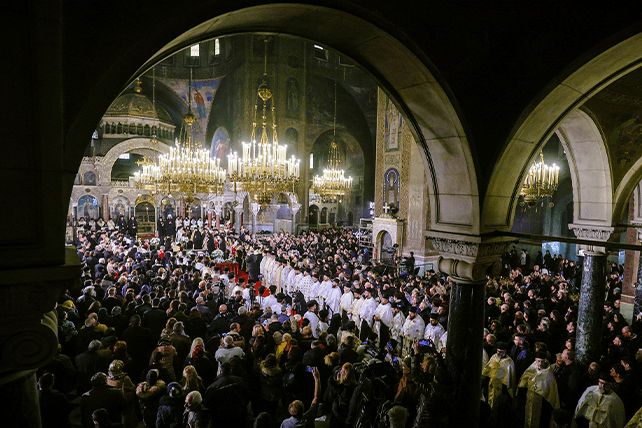ISTANBUL (RNS)—On Sunday, leaders of the Bulgarian Orthodox Church will gather in Sofia to decide on their new spiritual head — the Patriarch of All Bulgaria.
The Bulgarian Church’s last patriarch, Neophyte I, died in March, and according to church law, his successor must be elected in four months. The election will be held by a 140-member council of church leaders on June 30.
Coming just a few weeks after Bulgaria held national parliamentary elections, the choice for a new patriarch has been the subject of national attention.
Though the church is fully separate from the state, its constitution names Eastern Orthodoxy as the “Traditional religion of the Republic of Bulgaria,” and 85% of Bulgaria’s 6.5 million citizens identify as Orthodox Christians.
The new patriarch will be elected by a council made up of clergy and lay leaders coming from each of the church’s 14 eparchies, two of which represent the church’s diaspora (one serving in Europe with a metropolitan, or provincial leader, based in Berlin, and the other covering North America and Australia with its metropolitan based in New York City).
Church law dictates that candidates must be over 50 and have served as metropolitans for at least five years. Of the 14 metropolitans, nine meet the qualifications, and after 42 rounds of voting, three were finalized as candidates for Sunday’s elections.
They are metropolitans Grigorii of Vratsa, Daniil of Vidin and Gabriel of Lovech.
“They have many, many different views on many, many things,” Smilen Markov, a Bulgarian scholar of Orthodox Christianity at Oxford University, told RNS.
Markov stressed that the election was not a single-issue vote, but that the electors would be making their choices on many factors, from debates over liturgical language to monastic issues.
However, he noted that in the Bulgarian Church, much of the patriarch’s role is as an outward-facing leader and that the next patriarch will likely be remembered for how he addresses modernity and the wider Orthodox world.
According to Markov, among Orthodox scholars, the Bulgarian Church is known to have far less of an international or social presence than other major churches in Southeastern Europe, such as the Romanian and Serbian churches.
“One of the challenges is to overcome this self-imposed isolation,” explained Markov. “We live in a pluralistic society, in a liberal society, and we have to learn how to work within the two. (The church) has to learn the grammar of talking to the European institutions, it has to learn the grammar of talking to global institutions, it has to start talking about environmental problems and about human rights because these matters are very pertinent to the mission of the Orthodox Church.”

